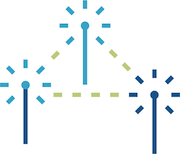This guide is supposed to help you to set up a local community – from an ongoing community to an audience for a local event.
The guide is just a start. A lot of people will know more about this. If you are one of them, please share your knowledge in the comments.
![]()

#Who Is Your Community?
First of all think about what kind of people would fit the community? Social, ecological or economic entrepreneurs, hackers, activists, artists, makers; people from companies; from waste, recycling or sustainability initiatives; from open source software, open hardware, open data, open everything; from blue economy, cradle to cradle, circular economy, biomimicry; engineers, researchers and so on – all of those would fit perfectly, but also others!
Ask yourself: Where can you find the people you want to engage? What channels to use to reach out? What do they want? What do they need? What could make them interested? Use a search engine and combine some of the words above with your city – ‘open hardware toronto’. Follow the tracks. Reach out to them & meet them.
![]()

#Invite & Communicate
Once you decided to run an event or start a local community you can start to communicate about it. There are several ways to do this. Just to name a few:
-
Facebook Event or Group – Facebook is a powerful way to find and connect people in today’s world. Set up a facebook event – so people can share it. Or for a more ongoing activities start a facebook group. Local OSCEdays groups have done both in the past. Post a link to your group or page in the global OSCEdays group so people close by can find it.
-
Other Social Networks – Twitter, Instagram and so on … there are other social networks than facebook. If you know how to use them and have an interest in doing it do it. There is a global OSCEdays twitter account – once you have set up your account ping the global account to be followed back and mentioned. Use the #oscedays hashtag in combination with your city like #oscedays #london. There is a twitter bot retweeting #oscedays tweets. Follow it to see what is going on in other places.
-
Website – If you have registered your event or community to the OSCEdays you have created a Readme Topic. Next to this you can also have another website for your event. Some people might be irritated if their first encounter with your local group is a forum page with a long URL. A cleaner easier to understand page might help to make a better first contact. If you are part of an organisation that already has a website you can for example create a subpage.
-
Flyers, Posters, Newsletters, Ads, Emailing … there are many more ways to how to reach out to people. Do an internet search for example on ‘event marketing’. Something should come up. If you have found a good resource share the link below in the comments.
![]()

#A Physicial Space
A community is mostly people meeting and interacting on a regular basis. A physical space is perfect for this! If you can manage to get a permanent physical space for your meetings or activities this will help a lot to get an ongoing and engaged local group. For some strange reasons most people can remember abstract things better if there is a physical space/place they can connect it to in their brain.
![]()

#Online Collaboration & Communication Infrastructure
There are many digital tools to stay connected in a team or community, share and create resources together and get some work done. Good and adapted tools can work to some extend in the same way as a physical space. Pick what you like and allows an open workflow.
When you registered to the OSCEdays you have created a Readme in the forum. You can use that as a base and transform it into a more permanent READ ME – use the forum for your teams collaboration, especially your city category and city tag. Have a look in the blue categories in the forum to see how the OSCEdays Board Of Stewardship is doing it.
Whatever you do, we encourage you to go the Open Source road – install a transparent workflow and use the benefits of it.
But keep in mind that most of these tools are in favour of people that like to read and to write. This might be not the case for the majority of people in your community. So not everyone might take part. But still – clear transparent communication and available documentation will also benefit them. And people from other parts of the world can see what you are doing in your local group.
![]()

#Shared Activities & Resources
Shared Activities are perfect way to get people together also on a regular basis. OSCEdays ACTIONS could be perfect for this.
Shared Resources are another perfect and usual driver. A physical space could be such a resource but also shared tools for example.
An event has a lot resource like qualities. It creates opportunities for people (for example to meet new people, learn new things, show off/advertise, make new connections or just have a good time and fun doing stuff with others).
Behind all of this are shared interests and maybe even shared needs. Getting together and join forces to full fill needs and follow interests is what creates a community.
![]()

#General Remark On Community Engagement
If you follow the hinds above you should be able to build a local community.
However be prepared to do a lot of work yourself. Studies show that in communities that are based on volunteer work very often the 80/20 rule applies meaning that a small part of the group (often just one or two people) is doing the majority of the work. But it is the smaller contributions of the others that create the full 100% and make the community work and give the 80% a meaning.
People will return to a community when they feel welcome and comfortable around the people that are part of it. Yes. It is a question of liking. And culture. Not everyone fits with everyone. Are people on the same page?
The role of liking becomes less important as a stabilizing factor the more shared and valuable resources are part of the game – space, tools etc. For that reason in companies the liking is not necessary to keep everything together, because people create an income for themselves together – but it is still important even in this organisations to create a good atmosphere and let people have a voice if the organisation is supposed to be healthy.
The OSCEdays is in favour of mutual respect, gender-, race- & cultural-equality, inclusiveness and openness. This is how this community was started and built and the OSCEdays culture. And we are convinced that this is the best way to create and run a really sustainable world.
![]()